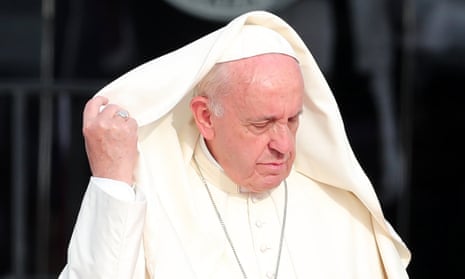Pope Francis has accused victims of Chile’s most notorious paedophile of slander, in an astonishing end to a visit meant to help heal the wounds of a sex abuse scandal that has cost the Catholic church its credibility in the country.
Francis said that until he sees proof that Bishop Juan Barros was complicit in covering up the sex crimes of the Rev Fernando Karadima, such accusations against Barros are “all calumny”.
The pope’s remarks drew shock from Chileans and immediate rebuke from victims and their advocates. They noted the accusers were deemed credible enough by the Vatican that it sentenced Karadima to a lifetime of “penance and prayer” for his crimes in 2011.
A Chilean judge also found the victims to be credible, saying that while she had to drop criminal charges against Karadima because too much time had passed, proof of his crimes was not lacking.
“As if I could have taken a selfie or a photo while Karadima abused me and others and Juan Barros stood by watching it all,” tweeted Barros’s most vocal accuser, Juan Carlos Cruz. “These people are truly crazy, and the pontiff talks about atonement to the victims. Nothing has changed, and his plea for forgiveness is empty.”
The Karadima scandal dominated Francis’s visit to Chile and the issue of sex abuse and church cover-up was likely to factor into his three-day trip to Peru that began late on Thursday.
Karadima’s victims reported to church authorities as early as 2002 that he would kiss and fondle them in the swank Santiago parish he ran, but officials refused to believe them. Only when the victims went public with their accusations in 2010 did the Vatican launch an investigation that led to Karadima being removed from ministry.
The emeritus archbishop of Santiago subsequently apologized for having refused to believe the victims from the start.
Francis reopened the wounds of the scandal in 2015 when he named Barros, a protege of Karadima, as bishop of the southern diocese of Osorno. Karadima’s victims say Barros knew of the abuse, having seen it, but did nothing. Barros has denied the allegations.
His appointment outraged Chileans, badly divided the Osorno diocese and further undermined the church’s already shaky credibility in the country.
Francis had sought to heal the wounds by meeting this week with abuse victims and begging forgiveness for the crimes of church pastors. But on Thursday, he struck a defiant tone when asked by a Chilean journalist about Barros.
“The day they bring me proof against Bishop Barros, I’ll speak,” Francis said. “There is not one shred of proof against him. It’s all calumny. Is that clear?”
Anne Barrett Doyle, of the online database BishopAccountability.org, said it was “sad and wrong” for the pope to discredit the victims since “the burden of proof here rests with the church, not the victims – and especially not with victims whose veracity has already been affirmed.”
She said: “He has just turned back the clock to the darkest days of this crisis. Who knows how many victims now will decide to stay hidden, for fear they will not be believed?”
Catholic officials for years accused victims of slandering and attacking the church with their claims. But up until Francis’s words on Thursday, many in the church and Vatican had come to reluctantly acknowledge that victims usually told the truth and that the church for decades had wrongly sought to protect its own.
Germán Silva, a political scientist at Santiago’s Universidad Mayor, said the pope’s comments were a “tremendous error” that will reverberate in Chile and beyond.
Patricio Navia, political science professor at Diego Portales University in Santiago, said the Karadima scandal had radically changed how Chileans view the church.
“In the typical Chilean family, parents [now] think twice before sending their kids to Catholic school because you never know what is going to happen,” Navia said.
